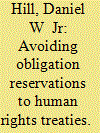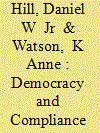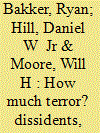|
|
|
Sort Order |
|
|
|
Items / Page
|
|
|
|
|
|
|
| Srl | Item |
| 1 |
ID:
147699


|
|
|
|
|
| Summary/Abstract |
This article examines the decisions of governments to enter reservations upon ratification of international human rights treaties. I argue that, in the context of the human rights regime, reservations are simply attempts to avoid international legal obligations where they would be consequential. I develop an explanation for their use that focuses on the following two factors: the legal constraints that already exist in domestic law and the likelihood that international agreements will be enforced by domestic courts. Using an original measure of domestic legal protection of civil, political, and personal integrity rights, I find evidence that governments are more likely to enter reservations when domestic legal standards are lax compared to those in the treaty and when judiciaries are likely to enforce treaty-based obligations. This suggests that full adoption of international human rights treaties is more likely when treaties will not create genuine domestic legal constraints and that explanations for treaty adoption and implementation must take reservations into account. It also suggests that adoption of international human rights law is best explained by the specific legal institutions that relate to domestic enforcement rather than broad distinctions between democratic/autocratic political institutions.
|
|
|
|
|
|
|
|
|
|
|
|
|
|
|
|
| 2 |
ID:
165439


|
|
|
|
|
| Summary/Abstract |
Research on international human rights law suggests that the beneficial effects of treaties depend on the strength of democratic political institutions. However, democracies are, by definition, compliant with many provisions in treaties that protect civil and political rights. Additionally, theories of compliance derive from a focus on civil and political rights rather than on other rights, so we lack a good understanding of whether predictions hold for other kinds of rights. We examine compliance with the Convention for the Elimination of All Forms of Discrimination against Women (CEDAW), which protects rights that are distinct from those that characterize democratic governance. To measure compliance, we create a new indicator of women's rights that offers several advantages over existing indicators. We examine the conditional effect of CEDAW using models that allow for heterogenous treaty effects. This helps to adjudicate between theories that expect treaties to be most effective in highly democratic countries and those that expect them to be most effective among partial democracies. Our findings do not support either expectation and suggest that effectiveness does not depend on democracy, at least in the case of CEDAW. This points to the need to enrich existing theories of ratification and compliance by accounting for differences in the nature of the rights protected by different treaties.
|
|
|
|
|
|
|
|
|
|
|
|
|
|
|
|
| 3 |
ID:
147838


|
|
|
|
|
| Summary/Abstract |
Our knowledge of the set of concepts that influence the number of terror attacks experienced by different countries is rudimentary. Existing work on the incidence of terror focuses upon the structural characteristics of polities, economies, and societies, and fails to place competition between dissidents and states center stage. It also tends to treat terror as isolated from other tactics that dissident groups might use to pressure the state. This study addresses these shortcomings by placing government and dissident group behavior at the center of the analysis. Drawing on arguments from the larger literature on dissent and repression, we argue that government behavior and dissident behavior are likely to be more important determinants of terror attacks than structural factors. We scour the literature for existing arguments to round out our model specification, and evaluate hypotheses using Bayesian statistical techniques and a broad scope of relevant data. For many of our independent variables we construct indices using measurement models that are able to account for measurement error and missing data, resulting in a more comprehensive set of data than previous studies. The results demonstrate that measures of government and dissident behavior have more explanatory power than measures of the concepts that populate existing research.
|
|
|
|
|
|
|
|
|
|
|
|
|
|
|
|
|
|
|
|
|